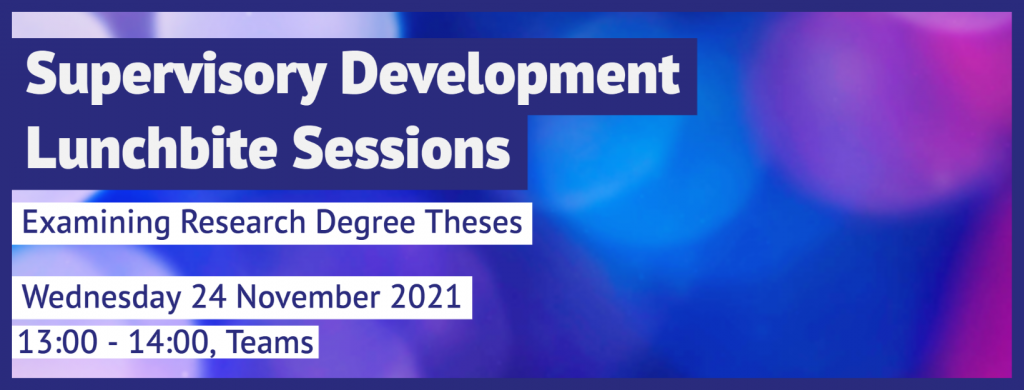
Hosted by the Doctoral College, these one hour online lunch bite sessions supplement the regular New and Established Supervisory Development Sessions and are aimed at all academic staff who are new to, or experienced at, supervising research degree students and are interested in expanding their knowledge of a specific aspect or process in research degree supervision.
Each session will be led by a senior academic who will introduce the topic, and staff will benefit from discussions aimed at sharing best practice from across BU. Bookings are arranged by Organisational Development.
This session is focused on expanding individuals’ knowledge on the research degree examination processes and responsibilities involved in examining a research degree thesis. This discussion will be led by Professor Mark Hadfield, FST.
Staff attending this session will:
- have gained additional knowledge of the purpose of the research degree examination
- have gained additional knowledge of the role of the research degree thesis examiners
- be aware of the relevant sections of the Code of Practice for Research Degrees
Further details on the session as well as information on future lunchbite sessions can also be found on the staff intranet.
Date: Wednesday 24 November 2021
Time: 13:00 – 14:00
To book a place on this session please complete the booking form.
Further details and future sessions can also be found on the Supervisory Development Lunchbite Sessions staff intranet page.











 SPROUT: From Sustainable Research to Sustainable Research Lives
SPROUT: From Sustainable Research to Sustainable Research Lives BRIAN upgrade and new look
BRIAN upgrade and new look Seeing the fruits of your labour in Bangladesh
Seeing the fruits of your labour in Bangladesh Exploring Embodied Research: Body Map Storytelling Workshop & Research Seminar
Exploring Embodied Research: Body Map Storytelling Workshop & Research Seminar Marking a Milestone: The Swash Channel Wreck Book Launch
Marking a Milestone: The Swash Channel Wreck Book Launch ECR Funding Open Call: Research Culture & Community Grant – Application Deadline Friday 12 December
ECR Funding Open Call: Research Culture & Community Grant – Application Deadline Friday 12 December MSCA Postdoctoral Fellowships 2025 Call
MSCA Postdoctoral Fellowships 2025 Call ERC Advanced Grant 2025 Webinar
ERC Advanced Grant 2025 Webinar Update on UKRO services
Update on UKRO services European research project exploring use of ‘virtual twins’ to better manage metabolic associated fatty liver disease
European research project exploring use of ‘virtual twins’ to better manage metabolic associated fatty liver disease